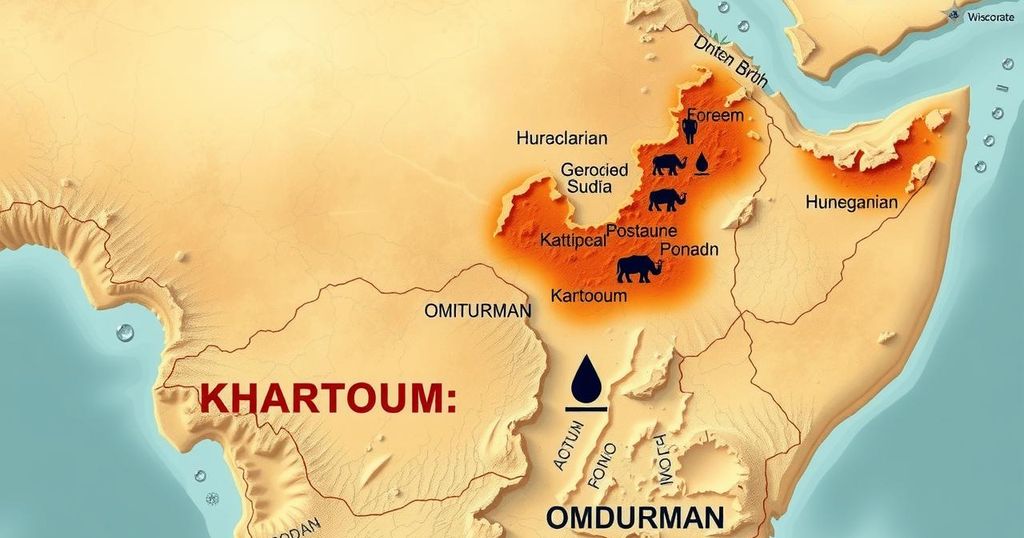Sudan Faces Cholera Outbreak as Civil War and Poor Infrastructure Worsen Health Crisis

A cholera outbreak in Sudan has claimed 172 lives, with over 2,500 reported cases in one week. Most affected areas are Khartoum and Omdurman, where many returnees struggle with access to clean water amid poor health infrastructure due to ongoing civil war. Health agencies warn of potential rapid spread as facilities become overwhelmed.
A recent outbreak of cholera in Sudan has taken a dire toll, claiming 172 lives while over 2,500 individuals have fallen ill just in the past week. The disease is particularly prevalent in and around the capital, Khartoum, as many Sudanese return home from fleeing the ongoing civil war. Unfortunately, the collapse of health and sanitation infrastructure has left residents with little access to clean water, a proven catalyst for the spread of cholera. This situation further exacerbates an already dire humanitarian crisis in the country that has existed for the past two years.
According to the Ministry of Health, this latest surge in cholera cases has grown alarmingly – reported daily cases have shot up ninefold from 90 to 815 between May 15 and May 25. Remarkably, since the beginning of this year, more than 7,700 individuals have been diagnosed with cholera, including a worrying number of over 1,000 children below the age of four. While the bulk of reports come from Khartoum and Omdurman, cases have also emerged in five surrounding provinces, illustrating the breadth of the outbreak.
Joyce Bakker, the Sudan coordinator for Doctors Without Borders, described the scene in Omdurman as overwhelming. The treatment centers there are inundated with patients. “Many patients are arriving too late to be saved… We do not know the true scale of the outbreak, and our teams can only see a fraction of the full picture,” Bakker reported, highlighting the urgency of the situation.
The root causes of this cholera outbreak stem from the aftermath of the civil conflict that has raged for over a year. Following the recapture of Khartoum by military forces from the paramilitary Rapid Support Forces, numerous displaced individuals have returned home; however, they are met with significant challenges. Damaged homes and impaired infrastructure, particularly in terms of clean water access, are major issues. Attacks on power plants have only made matters worse, causing further electricity disruptions that impact water supply.
“People have been drinking polluted water and transferring water into unhygienic containers,” noted Dr. Rania Elsayegh from Sudan’s Doctors for Human Rights. Limited access to health facilities contributes to the outbreak’s potential to spread like wildfire, as overcrowding in displacement centers hampers isolation efforts. Dr. Sayed Mohamed Abdullah from Sudan’s Doctors Union warned that more than 80% of hospitals are currently non-operational, exacerbating the crisis.
Cholera is widely recognized by the World Health Organization as a “disease of poverty,” thriving where sanitation is poor and access to clean water is scarce. The disease is caused by ingesting food or water contaminated with the bacterium Vibrio cholerae. Treatment can be straightforward, usually involving rehydration and antibiotics, but severe cases can be fatal in a matter of hours without proper care. Unfortunately, the WHO’s supply of oral cholera vaccines is critically low, complicating efforts to mitigate outbreaks amidst rising global cholera cases since 2021.
The geography of the crisis in Sudan reflects a nation torn apart by civil war since it began in April 2023. At least 24,000 individuals have reportedly died, and millions have been displaced, with substantial numbers seeking refuge in neighboring nations. Various regions, particularly Darfur, face declared famines as the fighting has escalated to the point of atrocities recognized as potential war crimes. Seasonal flooding adds another layer of hardship, continually damaging essential infrastructure each year.
Cholera is not new to Sudan. There was a significant outbreak in 2017 that resulted in around 700 deaths and over 22,000 illnesses within a few months. The ongoing destruction from the civil war has perpetuated subsequent outbreaks. Distressingly, reports indicate that cholera has swept through 11 of Sudan’s provinces during prior outbreaks, while recent illnesses like dengue and meningitis also emerge, contributing further to Sudan’s health challenges.
The cholera outbreak in Sudan poses an urgent humanitarian crisis, with the death toll reaching 172 and thousands more affected. The collapse of health infrastructure amidst a protracted civil war has made the situation dire, particularly in Khartoum and Omdurman. Health officials warn that without effective intervention, the outbreak could escalate. This situation reflects the ongoing complexities of poverty, conflict, and inadequate healthcare in the country, underscoring the need for both immediate action and long-term solutions to stabilize public health and safety in Sudan.
Original Source: www.newsday.com








